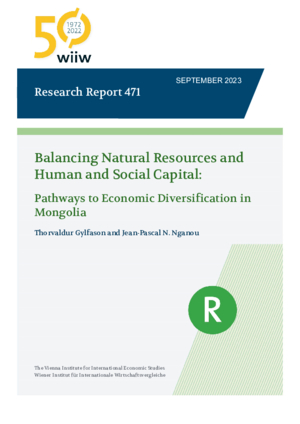Balancing Natural Resources and Human and Social Capital: Pathways to Economic Diversification in Mongolia
Thorvaldur Gylfason and Jean-Pascal N. Nganou
wiiw Research Report No. 471, September 2023
38 pages including 26 Figures
Economic diversification has gained significant attention as a crucial factor for sustainable development worldwide. This paper addresses the risks associated with extreme specialisation and explores the potential benefits of economic diversification for Mongolia. By comparing Mongolia with its designated aspirational and structural peers, the paper aims to shed light on strategies that can foster economic and societal diversification in the country. Although Mongolia possesses favourable levels of human capital compared with its peers, its unusually high ratio of natural capital to human capital highlights the necessity of reducing reliance on natural resources and promoting human capital-intensive economic activities. The paper examines the implications of declining demand for Mongolia's key minerals, primarily coal, resulting from climate change concerns and evolving investor preferences towards sustainability, China's coal consumption reduction goals, and the enduring impact of the COVID-19 pandemic. Through this analysis, the paper offers insights into pathways for Mongolia to diversify its economy and enhance the well-being of its people by striking a balance between natural resources and human and social capital.
Keywords: Economic growth, Economic diversification, Natural resources, Human capital, Social capital, Governance, Democracy, Transition
JEL classification: O11, O13, O15
Countries covered: Armenia, Australia, Canada, Chile, China, Colombia, Ecuador, Guyana, Kazakhstan, Malaysia, Peru, Qatar, Russia, ASEAN, EAP, Mongolia, United Arab Emirates
Research Areas: Macroeconomic Analysis and Policy
